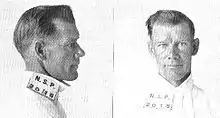Ben Kuhl
Ben E. Kuhl (1884 – paroled 1945, date of death unknown, possibly 1945) was, in 1916, the last known stage coach robber in the United States. Kuhl took part in the robbery of a mail stage wagon in Jarbidge, Nevada, US; the driver, Fred M. Searcy, was killed. The incident became a myth: "Staging a Robbery Without a Coach".[1][2] While most of the evidence against him was circumstantial, a bloody palm print on an envelope led to Kuhl's conviction. Kuhl's trial, which began in September 1917, was noted to be the first time palm prints were used as evidence in a U.S. courtroom.[1][3] State v. Kuhl also set the precedent that palm prints were as valid as fingerprints in criminal cases for identifying individuals.[4]
Ben E. Kuhl | |
|---|---|
 Mugshot of Ben Kuhl, 1917 | |
| Born | 1884 Michigan |
| Died | 1945 (aged 60–61) Northern California |
| Nationality | American |
| Occupation | stage coach robber, mail robber, horse thief, baker, drifter |
| Known for | Robbery of a mail stage wagon |
| Height | 6 ft (183 cm) |
| Criminal status | Commuted |
| Spouse(s) | Minnier |
| Children | 1 son |
| Motive | Financial |
| Conviction(s) | Murder |
| Criminal charge | robbery, murder |
| Penalty | Death |
| Partner(s) | Ed Beck, Billy McGraw |
| Details | |
| Victims | Fred M. Searcy |
| Date | December 5, 1916 6:30 PM |
| Country | United States |
| State(s) | Northern California, Nevada, Idaho, Oregon |
| Location(s) | Jarbidge |
| Target(s) | mail stage wagon |
| Killed | 1 |
| Weapons | .44 caliber |
Biography
Ben Kuhl was from Michigan.[5] In 1903, he was jailed in Marysville, California for petty larceny, and had also been sentenced to do 1 to 10 years in Oregon for horse theft. Kuhl arrived in Lander County, Nevada in 1916 and lived in a tent with two other drifters, Ed Beck and Billy McGraw. He worked as a cook at the OK Mine for about a month before he was fired for attempting to jump another man's mining claim. He was arrested for trespassing in Jarbidge.[6]
The Jarbidge Stage Robbery occurred on December 5, 1916, just before 6:30 PM. The mail wagon from Three Creek, Idaho, drawn by two horses, was ambushed. Searcy was killed by a .44 caliber slug to the head, and about $3,000 was stolen.[1] While the money was never recovered, almost fifty pieces of evidence were collected. Kuhl, Beck, McGraw, and another acquaintance, B.E. Jennings,[7] were caught soon after the incident occurred. Most of the evidence against Kuhl was circumstantial. However, there was a bloody palm print on a letter from the wagon's mail pouch;[8] and Kuhl became the first American convicted of murder based on a palm print. His death sentence was commuted to life in prison at the Nevada State Prison in Carson City, Nevada, but he was paroled on May 7, 1945.[9]
Kuhl was slender and nearly 6 feet (1.8 m) tall; he had light blue eyes. His wife, Minnier (nicknamed "Minnie"), and a son lived in Salt Lake City, Utah;[9] she divorced Kuhl after the conviction. His mother lived in Kalamazoo, Michigan; his father in Walla Walla, Washington. Kuhl is thought to have died of pneumonia or tuberculosis in northern California, possibly Sacramento or San Francisco, within 6 to 12 months of his release.[10]
References
- Rocha, Guy (November 2003). "Staging a Robbery Without a Coach". Nevada State Library and Archives. Archived from the original on 13 November 2010. Retrieved 26 May 2012.
- Wines, Claudia; Northeastern Nevada Museum (5 November 2008). Elko County. Arcadia Publishing. pp. 107–. ISBN 978-0-7385-5886-8. Retrieved 25 May 2012.
- "Stage Lines". clan.lib.nv.us. Archived from the original on 4 March 2016. Retrieved 26 May 2012.
- Newton, David E. (2008). DNA Evidence and Forensic Science. Infobase Publishing. pp. 64–. ISBN 978-1-4381-0019-7. Retrieved 25 May 2012.
- "Nevada State Prison Inmate Case Files Ben E. Kuhl". Nevada State Library and Archives. Archived from the original on 15 April 2013. Retrieved 26 May 2012.
- Hickson, Howard (4 October 1998). "Case Number 606 Makes History A Murder in Jarbidge, 1916". Great Basin College. Retrieved 26 May 2012.
- Hall, Shawn (1 March 1998). Old Heart Of Nevada: Ghost Towns And Mining Camps Of Elko County. University of Nevada Press. pp. 114–. ISBN 978-0-87417-295-9. Retrieved 25 May 2012.
- "The Last Stage Robbery – State v. Kuhl". Nevada State Library and Archives. Archived from the original on 29 October 2013. Retrieved 26 May 2012.
- Turner, Erin (18 September 2009). Rotgut Rustlers: Whisky, Women, and Wild Times in the West. Globe Pequot. pp. 59–. ISBN 978-0-7627-5536-3. Retrieved 25 May 2012.
- Westways. Automobile Club of Southern California. 1977. p. 80. Retrieved 25 May 2012.